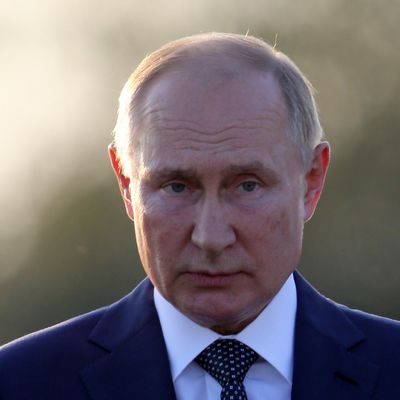
The New York Times has broached the awkward question that has been on the minds of anyone who has paid even passing attention to Vladimir Putin recently: Has he lost his marbles? The Times reports that people have noticed that Putin “has fundamentally changed amid the pandemic, a shift that may have left him more paranoid, more aggrieved, and more reckless.” Two years since the onset of COVID, the Russian leader remains severely isolated, interacting with cabinet officials largely via video and keeping trips abroad to a minimum. When he does have to meet people face-to-face in Moscow, whether it’s Foreign Minister Sergey Lavrov or French president Emmanuel Macron, they must first pass through a “disinfection tunnel” and then sit at a social distance of Olympian proportions, at tables so long that they have become a physical manifestation of Putin’s remoteness from the rest of the world. The tables have naturally become a meme:
Much ink has been spilled over why Putin seems so eager to invade Ukraine, a risky move that could blow back badly in his face and thus runs counter to Russia’s “interests” — that old and crumbling pillar of the foreign-policy universe, where nation-states are considered fundamentally rational actors that obey the iron logic that governs matters of war and peace. The idea that statecraft (to use another grand term of art) is a kind of science, determined with cold precision by unsentimental analysts, has always been false. “Policy is not a dry, airless product that emerges full-blown from the heads of people,” Richard Holbrooke once said. “It is often the product of accidents, egos and ambitions in conflict, misunderstandings, and deception, as well as careful plans.” To this list, we might add the febrile imaginings of a person who is lacking the kind of grounded perspective that comes from regular human interaction. Putin’s “circle of contacts is getting smaller. It affects his mind,” a former government official told the Financial Times. “He used to see things in 360 degrees — now it’s more like 60.”
No one can see into another person’s mind from afar, of course. And plenty of perfectly sane leaders, including our own, have made catastrophic foreign-policy decisions that, in retrospect, seem quite bonkers. But as the will-he-or-won’t-he predicament over Ukraine continues, the possibility that Putin is not playing with a full deck of cards at the very least robs the conflict of the narrative power that has been invested in it by those in the West who see it as a battle between the forces of good and evil, and who imagine Putin in his lair hating freedom the way the Grinch hates the singing of the Whos. Even more terrifying, this extremely powerful, extremely horrible person might invade Ukraine for reasons that are as unhinged as they are inscrutable — and maybe even understandable. As we all know by now, isolation is a hell of a drug.






























